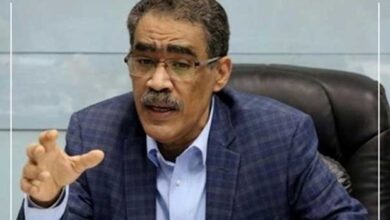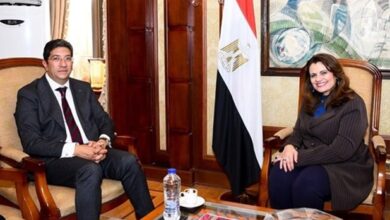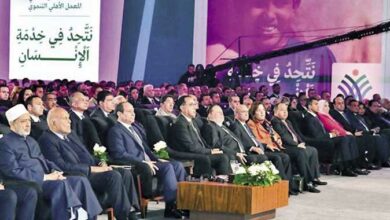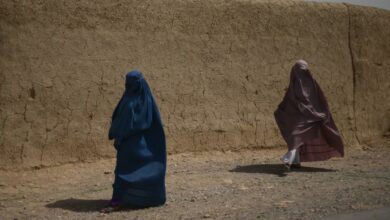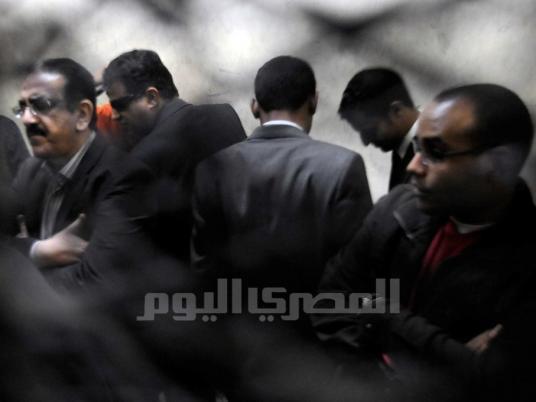
Sherif Mansour was safely ensconced in Washington, DC last year when the Egyptian government brought charges against him and 42 others in what has become dubbed “the NGO trial.” Yet he forfeited the comfort of distance and boarded a plane back to Egypt this summer to stand in the defendants’ cage because he felt that the stakes were higher than a possible prison term.
“I wanted to make sure that the trial did not further indict people in the NGO community,” Mansour says through an expanding cigarette smoke haze. “It’s not fair to Egyptian civil society to have to deal with the consequences of the case.”
Closing arguments in the NGO trial are scheduled for Saturday, and a verdict is expected sometime in December. But the December 2011 raid against foreign NGOs and the subsequent trial have already created an atmosphere in which large parts of civil society are more wary, even as Egypt needs them to be bold.
A brief spring for civil society
Before its attitude turned sour, the Egyptian government opened the door to engagement with domestic civil society, and Mansour was one of those who walked through it. A dual US-Egyptian citizen, Mansour had headed up the Middle East and North Africa program for Freedom House, a democracy and human rights NGO, in the US capital since 2005. When the revolution tilled the soil anew for civil society, Mansour returned to help plant seeds by providing trainings and mentorships for civil society activists.
“There was a new generation of people who wanted change, and saw NGOs as a venue for expression,” says Mansour. “This [let] NGOs play a replacement role for a lot of civil society power normally present in a democratic system. They replaced the role of political parties, media, even unions, because there was otherwise so little space for civil society.”
The heady atmosphere attracted others eager to engage Egypt’s resurgent civil society. Robert Becker and Hafsa Halawa both came to Egypt with the National Democratic Institute, a pro-democracy NGO loosely affiliated with the Democratic Party in the US, in the summer of 2011; both are now defendants in the case. Sharing a small table in a Zamalek cafe, both remembered a renewed vigor running through the veins of post-revolutionary civil society.
“Civil society was very vibrant before the revolution, but the fear barrier fell after the revolution,” says Halawa. “There was more money, more active participation, local community groups doing things for their communities, human rights groups doing more.”
At the time, the then-ruling Supreme Council of the Armed Forces seemed to take the increased NGO presence in good faith. Mansour had no problems meeting with then-Social Solidarity and Domestic Trade Minister Gouda Abdel Khaleq to have Freedom House officially registered within the country.
“There was a spirit of openness, not just with NGOs but with everything, that lasted until June,” says Mansour.
The National Democratic Institute, or NDI, initially had a similarly open relationship with the SCAF-led government, which made it all the more perplexing for Halawa and Becker when the axe fell later on.
“Our program was very well-known with the government,” says Halawa. “We had monthly meetings updating them on our projects; we had a good relationship with all the entities that oversee the activities of NGOs …”
Becker cuts in: “We opened three offices, an Egyptian bank account, and in fall of that year, they sanctioned us as election workers.” His face is etched with incredulity. “I’m charged with managing an illegal NGO, but I had had every indication that, based on the six years of work [NDI had] done, everything was fine.”
How did the official line toward civil society sour so quickly? Mansour blames a SCAF-led government spooked by increasingly assertive activists in the streets. “SCAF became impatient and fed up with criticism, because revolutionaries were asking for more and more,” he says.
Becker saw the writing on the wall during the transitional period last year, pointing to the widespread use of military detention and justice and the SCAF’s violent response to the Maspero and Mohamed Mahmoud Street protests.
“An estimated 12,000 people got put [before] military trials,” he says. “Many different voices took to the streets in protests and were met with tear gas and bullets.” He shakes his head. “Not a good omen for civil society.”
Mansour also points to a dithering and security-centric US foreign policy. Though the US steered more funding toward civil society groups since the start of the revolution, US Secretary of State Hillary Clinton waived the requirement making aid conditional on respecting democratic and human rights norms because aid to the Egyptian military was seen as crucial to US national security. This move came amid the objections of some State Department staff who cited in vain the SCAF’s dubious human rights record.
“There was one point when the US was actually going to consider conditionality in the NGO case, but they didn’t have the guts,” he says. “So they resorted to the same strategy: Stick to the safe ground.”
Whatever the initial cause, all interviewed for the story mentioned an increasingly hysterical propaganda campaign in Egypt’s state-run media outlets beginning in summer of 2011. The campaign, which accused NGOs of being the agents of foreign powers bent on tearing Egypt asunder, culminated in the raid later in the year and seemed to confirm that the SCAF-led government no longer welcomed a robust civil society.
“During Mubarak’s era, there were always accusations that we were working for foreigners, but under the SCAF NGOs were being brought to court,” says Mohamed Zaree, project manager at the Cairo Institute for Human Rights Studies.
Speaking of his organization’s work, he adds, “We tried to negotiate with the government; we told them we wanted to help liberate the NGOs and work transparently in accordance with good practices and standards.”
High stakes
Everyone interviewed agreed that Egypt’s inchoate democracy may be in jeopardy if the defendants are found guilty. Moreover, civil society is already feeling the squeeze even as Egypt settles in under an ostensibly democratically elected government.
“When legitimate international groups are subject to an armed raid, a travel ban and felony charges for teaching democracy, it makes this country a bad investment for foreign funding to finance civil society operations,” says Becker.
“You have civil society … walking on eggshells in this country right now. Despite the change in government, you still have NGOs that are being harassed,” he adds, citing examples from earlier this year in which organizations working on seemingly innocuous causes, such as helping orphans, had funds blocked by the government.
Zaree agrees that the trial is making donors reluctant to fund civil society activities, and further asserts that the new NGO law being considered by Morsy’s government could seal the lid over civil society, claiming that provisions in the draft bill circulating within the Cabinet allow the government to control the funding, internal management and board composition of NGOs.
“They want to convert NGOs from being independent entities to arms of the government,” he says.
Despite this, however, many NGOS have continued to access funding from donors abroad, and most foreign NGOs continue to operate, albeit warily in some cases.
Mansour, for his part, takes a broader view and considers how a guilty verdict would diminish Egypt’s democratic transition and human rights protections, particular for women and religious minorities, in light of an increasingly symbiotic relationship between the Muslim Brotherhood and the military.
“It’s going to mean that civil society is not going to be engaged in our society for a very long time, and it’s going to threaten a lot of key elements in a society that’s being run by a religious authority and a military government,” he says.
His expression darkens. “Without [civil society] groups, we are putting our transition on the Iranian track.”
But as the trial lurches to a conclusion, Mansour, Becker and Halawa are still sanguine about the outcome. All three expressed faith that the judicial system will recognize the case as politically motivated, and each of them emphasized their wish for a just verdict to emerge based on the merits of their case.
“As someone who wants to help work for democracy, I’m not going to stand up and say, ‘Forget transparency, get someone to throw this case out,’” says Halawa. “I believe in the judicial system. We have transparent, fair judges, and there’s no way that, as an Egyptian first, I would want anything else.
The court case continues.

